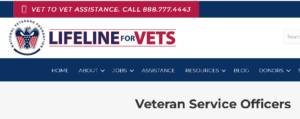Veterans Benefits for Caregivers – A Deeper Dive
 Submitted By Nancy R. Poland
Submitted By Nancy R. Poland
Graces Message
Not enough veterans or their caregivers utilize the Veteran’s benefits offered by the government.
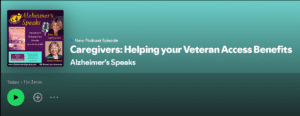 Who in our society is most deserving of care? I vote for the veterans and their caregivers. This article, a follow-up to my interview with Lori La Bey on veteran benefits, is for veteran caregivers. I call a “deeper dive,” after my dad, a Navy man. Grab a beverage, settle in, and watch or listen to the discussion between Lori and me, or read the article first.
Who in our society is most deserving of care? I vote for the veterans and their caregivers. This article, a follow-up to my interview with Lori La Bey on veteran benefits, is for veteran caregivers. I call a “deeper dive,” after my dad, a Navy man. Grab a beverage, settle in, and watch or listen to the discussion between Lori and me, or read the article first.
Not enough veterans or their caregivers utilize these government benefits. If you agree, please share this article and the interview so caregivers can become informed.
According to USA Facts, there are 16.2 million U.S. veterans. Over a quarter are over 75 years of age. Watch this 51 second video for to learn about our U.S. veterans.
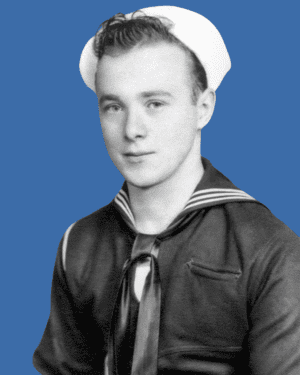 This is my dad, Lee, a World War II veteran, self-employed entrepreneur, a dad of four daughters, and friend to all. He was also strict (perhaps he thought his daughters were an extension of his Navy trainees) and had a deep faith in God. Here he is as a young Navy recruit.
This is my dad, Lee, a World War II veteran, self-employed entrepreneur, a dad of four daughters, and friend to all. He was also strict (perhaps he thought his daughters were an extension of his Navy trainees) and had a deep faith in God. Here he is as a young Navy recruit.
Dad was certain he would work until the day he left this earth. Unfortunately, diagnosed with dementia in his seventies, that plan ended prematurely. My parents had few financial resources. What to do?
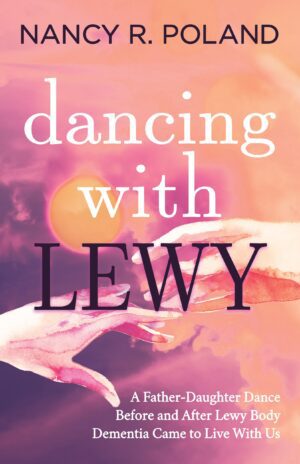 I told our story in Dancing With Lewy – A Father Daughter Dance Before & After Lewy Body dementia Came to Live With Us. I tell how a VA benefit, Aid & Attendance, came to the rescue.
I told our story in Dancing With Lewy – A Father Daughter Dance Before & After Lewy Body dementia Came to Live With Us. I tell how a VA benefit, Aid & Attendance, came to the rescue.
Aid & Attendance
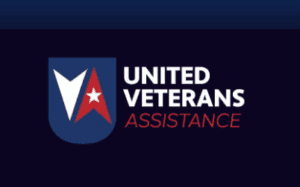 Aid & Attendance – an unusual name. When I chat with veterans I ask if they have heard of Aid & Attendance. They often reply, “no.” Only by being in the right place at the right time, I learned of this tax-free VA benefit, which made a dramatic difference in my parents’ final years.
Aid & Attendance – an unusual name. When I chat with veterans I ask if they have heard of Aid & Attendance. They often reply, “no.” Only by being in the right place at the right time, I learned of this tax-free VA benefit, which made a dramatic difference in my parents’ final years.
My sister and I attended a conference at the University of Minnesota about memory loss. There I heard about Aid & Attendance. The application process was involved, however after persistence, and help from a Veterans Service Organization, Dad finally received the pension plus backpay, approximately $1600 a month. (It is more now.)
Aid & Attendance is for wartime veterans and their spouses sixty-five and over. This financial aid helps offset the cost of long-term care for those needing assistance with activities of daily living. Watch a video and learn about the requirements here: Aid & Attendance.
Information Hunt
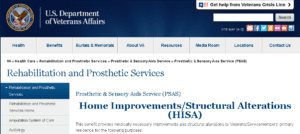 Friends, we must educate veterans and their caregivers about the available benefits. The VA budget has grown over the past decade, and the number of veterans is decreasing. Funding is available – our government wants to help veterans. However, in this election season there are rumblings about stripping out unused money of the various federal budgets. We should approach VA benefits as “use it or lose it.”
Friends, we must educate veterans and their caregivers about the available benefits. The VA budget has grown over the past decade, and the number of veterans is decreasing. Funding is available – our government wants to help veterans. However, in this election season there are rumblings about stripping out unused money of the various federal budgets. We should approach VA benefits as “use it or lose it.”
One example of an underused benefit is the Home Modification Program, where $150 million is available each year. These grants are based on disability, not income. Less than half of eligible veterans take advantage of this grant program. There is a nice summary and downloadable booklet here at the AARP Website.
How do veterans and their caregivers learn about these various benefits? These websites will help you on your information hunt.
- VA.Gov is the most comprehensive and up-to-date source. While extensive, it is easily searchable.
- Benefits.Gov gives a nice summary of well-known and unique benefits, however it is being updated so be patient with your hunt.
- AARP has easy-to-find resources. Simply click on the AARP link, or head to the AARP website and place “Veterans” in the search magnifying glass.
Programs for Caregivers
The VA has two specific programs for caregivers. The veteran must be enrolled in VA healthcare. The caregiver applies either on the VA website, or by printing out and mailing the applicable forms. But first, ensure you have the necessary paperwork on hand before applying.
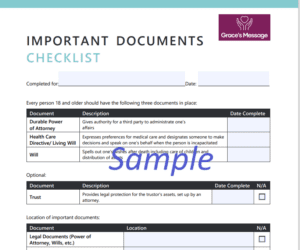 You will need the DD Form 214, also known as the Certificate of Release or Discharge from Active Duty, to apply for benefits. If you cannot find the release papers, request records here. Review the application forms for other required documents.
You will need the DD Form 214, also known as the Certificate of Release or Discharge from Active Duty, to apply for benefits. If you cannot find the release papers, request records here. Review the application forms for other required documents.
At this link on my website, gracesmessage.com, under caregiver resources, find a free downloadable Important Documents Checklist. Complete this with your care recipient to help find their documents and identify important people such as insurance agents.
While you are at it, complete a copy for yourself!
The Program of Comprehensive Assistance for Family Caregivers is the first program I will discuss for caregivers. Find the specific requirements by clicking here: PCAFC.
This program includes care or assistance to support these parts of the Veteran’s life:
- Health and well-being
- Everyday personal needs (like feeding, bathing, and dressing)
- Safety, protection, or instruction in their daily living environment
Eligible primary and secondary family caregivers can receive these benefits:
- Caregiver education and training
- Mental health counseling
- Travel, lodging, and financial assistance when traveling with the veteran to receive care
A monthly stipend is available to caregivers of eligible veterans with a severe injury in the line of duty. They must have been in the service before May 7, 1975, or on or after September 11, 2001. Benefits include financial stipends, potential access to health insurance, mental health services, and respite care.
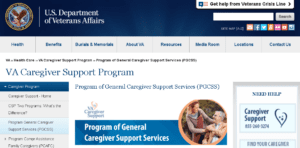 A second VA program for caregivers is called the Program of General Caregiver Support Services, found at this link: PGCSS. This program does not include funding; however, it incorporates important training and support for caregivers. These “General Caregivers” do not need to be a relative or live with the veteran. Find information about the application process from a Caregiver Support Coordinator (CSC). Support includes:
A second VA program for caregivers is called the Program of General Caregiver Support Services, found at this link: PGCSS. This program does not include funding; however, it incorporates important training and support for caregivers. These “General Caregivers” do not need to be a relative or live with the veteran. Find information about the application process from a Caregiver Support Coordinator (CSC). Support includes:
- Videos for skill training
- Mobile, email, and web support
- Support groups, individual coaching
- Peer support
- Respite care
You can always call the VA National Caregiver Support Line – 855-260-3274 where a CSC will assist you.
One more important VA service for caregivers, and all who care about our veterans.
Veteran Suicide Prevention
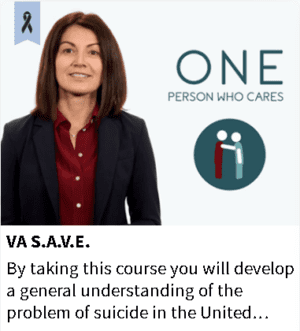 Do you know a veteran who may be at a high risk of suicide?
Do you know a veteran who may be at a high risk of suicide?
S.A.V.E. stands for Signs, Ask, Validate, Encourage, and Expedite, a veteran suicide prevention program. This program equips anyone who interacts with veterans. Learn how to care for, support, and express compassion when talking with a veteran who could be at risk. The video also has helpful information for anyone who wants to learn more about preventing suicide.
Anyone can create a login and sign up for the 18 minute course here: S.A.V.E. There is no charge, and C.E.U.s are available. (Note: I found the Internet Explorer browser does not work well for the video, try Google.)
Veterans Crisis Line: 1-800-273-8255
Problem Resolution and Assistance
What type of problems do veterans, or their caregivers run into accessing benefits? Application processes are complex requiring specific documentation. Financial forms, medical records, and more may be required. When I applied for my dad’s Aid & Attendance benefit over a dozen years ago, there were significant backlogs and delays. The VA has implemented improvements aimed at streamlining the process and reducing backlogs, so I hope the process is more efficient now.
If you need help, where do you go?
- The VA website offers online tools and resources to help with understanding and applying for benefits. The eBenefits portal allows veterans to manage their benefits and check claim status online.
 I called the local Veterans Service Organization (VSO) for assistance when applying for Dad’s benefits. They were quite helpful and offered free assistance, telling me the exact wording to use on the forms. VSOs can also help navigate the appeals process. Find one by calling 888-777-4443 or search for a local VSO here: VSO Offices.
I called the local Veterans Service Organization (VSO) for assistance when applying for Dad’s benefits. They were quite helpful and offered free assistance, telling me the exact wording to use on the forms. VSOs can also help navigate the appeals process. Find one by calling 888-777-4443 or search for a local VSO here: VSO Offices.- I also spoke with our local county Veterans Affairs (VA) Representative when my family needed help. (Listen to the video with Lori La Bay and me for an illustration on how our county helped my parents when they were in a temporary monetary crisis.) VA representatives can also provide information on the status of claims and offer guidance on next steps.
- If you are not able or willing to complete the paperwork, you can hire an Accredited Attorney or Claims Agent specializing in veterans’ law. They can represent veterans in their claims and appeals. These professionals often work on a contingency basis, meaning they only get paid if the veteran wins their case.
If your claim is denied file an appeal, which may involve submitting additional evidence, attending hearings, and collaborating with a representative.
Most Important? Be persistent!
My goal is to help caregivers find resources to improve the lives of their care recipients and reduce the stress of caregivers. I trust the interview with Lori and this article both assist caregivers of our veterans. You can visit www.gracesmessage.com for more caregiver resources, and to sign up for my newsletter. You will also find information about my books, Dancing With Lewy, and Remarkable Caregiving, the Care of Family and Friends. Both books have compelling stories and helpful tips and resources.
For all of you at Alzheimer’s Speaks and Dementia Map struggling with dementia, may you find strength and hope in this poem by my dad who never stopped fighting, even when plagued with progressive dementia.
Poem
Don’t look back friend, look ahead
You’ll meet the living, not the dead.
Soldiers meet the enemy face to face,
They don’t run a backward race.
If you can’t find the enemy up ahead,
It’s because you stopped fighting, and friend, you’re dead.
‘Cause in this life, the enemy’s there,
You may not always know just where.
So, make up your mind, the hour is late,
Some battles are small, and some are great.
You’ll be fighting God’s battle right up to the gate.
So, lead on warrior, and don’t despair,
‘Cause at the end of the battle we’ll all be there.
By Lee Eggerud
Nancy R. Poland
Graces Message
Nancy R. Poland shares her passion for helping caregivers, live with grace and hope. Her website for a wealth of information for caregivers. It provides tailored resources, highlights of her books, hope for those who have experienced loss, valuable insights regarding dementia, improving senior’s lives, health care news, and more. Nancy also shares a personal page on loss that has resources for processing grief.


